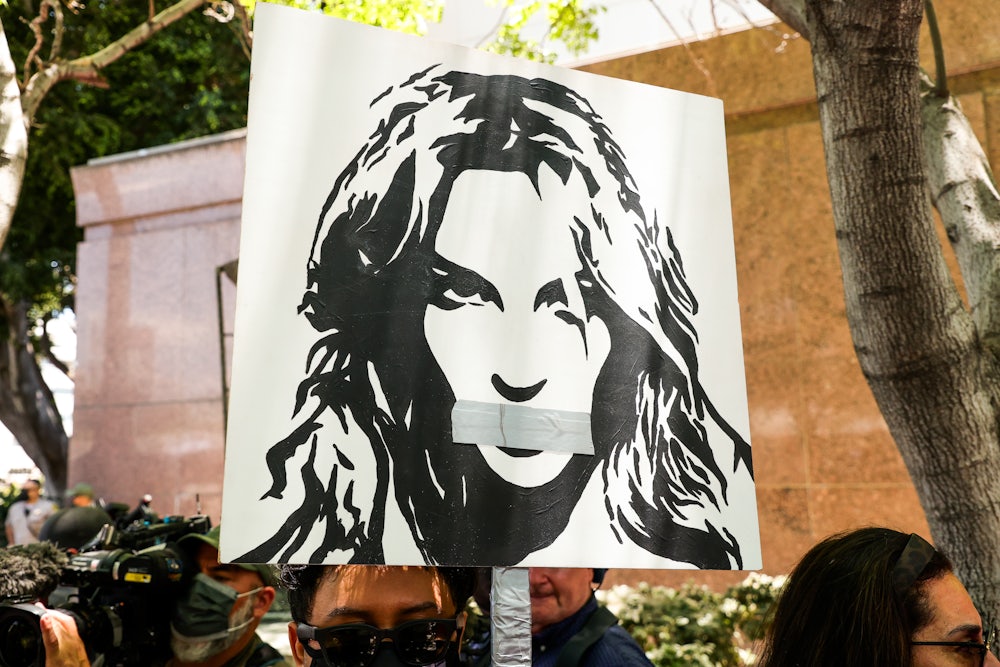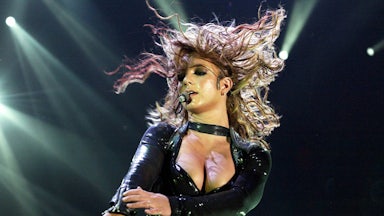It was all Britney’s idea. The 16-year-old singer had just recorded her first album and was about to shoot her first music video with Nigel Dick, then best known for directing videos for Oasis and Guns N’ Roses. His vision for her debut single was basically: Britney dances on Mars! Britney told the president of Jive Records, “This is horrible. No way am I doing this.” She called up Dick and pitched him something else: She wanted to be dancing in a school flanked by cute boys, like a scene from Grease.
He acquiesced. As for the wardrobe, he figured she’d wear jeans and a T-shirt, maybe carry a backpack. Again, she pushed back: Shouldn’t she be dressed like a schoolgirl? As Dick told me on the twentieth anniversary of “... Baby One More Time,” “I was very dubious about this idea. But I was overruled.”
The single, which was selected and written for Spears by middle-aged men, and the video, a product of her creative vision prevailing over the men’s judgment, rocketed Britney into superstardom, a status she has retained ever since. That duality—she’s just doing what they told her to do; no, she’s doing what she wants to do—encapsulates what has been so fascinating about Britney from the get-go. The animating tension of her place in public life has always been this: Who is in control of Britney Spears?
Now this question of control, which has dogged her for the entirety of her career, has taken on a new, violent charge as more details about her conservatorship, a legal arrangement that puts all major decisions about her life under the control of her father, make their way into public view. As The New York Times’ Liz Day notes in the Framing Britney Spears documentary, conservatorships are typically reserved for “elderly people who aren’t able to take care of themselves or their money,” not for young, able-bodied people capable of having a productive career. On Wednesday, media outlets published Spears’s statement to a judge presiding over the hearing regarding ending this legal arrangement, which Spears describes rather credibly as “abusive” and “traumatizing.” She’s been subject to it for 13 years.
In the early days, the question of whether Spears was being exploited often came from a place of genuine, valid concern. Reasonable people can, after all, understand the ways in which the entertainment industry, or really any workplace, can be an exploitative, abusive, and dangerous place for a child. Those worries are only more fraught when the child in question is a top-tier celebrity, her image beamed out to millions of impressionable children who want to be just like her.
Spears’s harrowing account of her life under an oppressive conservatorship has forced a larger reckoning, even among those who fretted over her early career with genuine concern for her well-being. Back when Spears was just starting out, there was often an ageism and sexism laced throughout ostensibly well-intentioned inquiries about whether Britney the person was truly responsible for Britney the pop phenomenon. The thinking went: Could some girl from nowhere, Louisiana, who was famously part of Disney’s teen-star assembly line really be the creative visionary behind her instantly, enormously successful career?
Spears’s demands for emancipation are making similar demands on us: that we contend both with the toxicity of the narrative that led to her chattelization and the fact that it has lasted as long as it has. The fear that she was being forced to do things in the furtherance of her career that she did not want to do have led, ironically and inevitably, to that very state.
As Spears details in her statement, while forced to stay at a rehab facility:
I worked seven days a week, no days off, which in California, the only similar thing to this is called sex trafficking. Making anyone work against their will, taking all their possessions away—credit card, cash, phone, passport—and placing them in a home where they work with the people who live with them.… If I didn’t do any of my meetings and work from eight to six at night, which is 10 hours a day, seven days a week, no days off, I wouldn’t be able to see my kids or my boyfriend. I never had a say in my schedule.
Her testimony about the conservatorship adds a harrowing dimension to the information already revealed to the public by the Framing Britney documentary released earlier this year. As Spears tells it, she is a grown woman who does not control the fortune she has earned by working virtually nonstop (and, as she asserts in her statement, often in spite of her express wishes for a break and even while she was sick) since she was a teenager; whose ability to see and raise her own children is contingent upon a relentless work schedule to which she never consented; who, in perhaps the most chilling revelation of all, was put on lithium against her will and, against her express wishes to have another baby, is forbidden from getting her IUD removed. Her current circumstances sound like some nightmarish mashup of female body horror stories, like if you wrapped up your copy of The Handmaid’s Tale in The Yellow Wallpaper.
The person responsible for—and profiting from—this legal arrangement? James Spears, Britney’s father, who was appointed as conservator in 2008 and whom Britney says she plans to sue as soon as she is free from the conservatorship that currently prevents her from even hiring an attorney to represent her interests. Court records obtained by The New York Times reveal that Britney has been in revolt against her father’s draconian hold on her life and career since 2014. In a 2016 report, a court investigator wrote that Britney “feels the conservatorship has become an oppressive and controlling tool against her”; in 2019, she told the court “she had felt forced by the conservatorship into a stay at a mental health facility and to perform against her will.”
Spears’s confinement calls to mind other high-profile instances of older men holding young, electrifyingly talented female vocalists captive, claiming these women can’t thrive without them when in fact it seems quite obvious that the opposite case is true—all the while minting money off a woman’s gifts and misery. It’s hard to hear about Spears’s case and not think of Tommy Mottola signing a 19-year-old Mariah Carey, marrying her four years later (when Mottola was 43 years old), and treating her, as Carey has repeatedly said, “like a prisoner,” with security cameras and teams following her around the clock. (Carey tweeted her support for Spears Wednesday night.) There are echoes, too, of Phil and Ronnie Spector, then Veronica Bennett, whose voice literally is the wall of sound that makes “Be My Baby” a perfect song—she sang lead and all the backing vocals. Once they married, Phil controlled all their money and, Ronnie has since claimed, sometimes forbade her from leaving their home. As a Vulture obituary for Phil Spector put it, Phil “sidelined one of the most vibrant voices of her generation.”
Part of what’s striking about Spears’s candor is that she hasn’t given a real interview in years; her social media feels both authentic—#FreeBritney sleuths have a forensic knowledge of Spears’s affinity for emojis and can suss out with ease when an impersonator is posting on her behalf—and obviously, totally staged. So her court testimony is the first time in ages we’ve actually heard from her, and the first and only context in which she has insisted that she has no control over any meaningful part of her life. She’s spent much of her career insisting just the opposite: that despite constant speculation to the contrary, she was the one calling all the shots.
In Framing Britney Spears, an interview clip from the “Oops … I Did It Again” promotional gamut shows what was, at the time, a typical exchange. Now it seems hauntingly illuminating: A male journalist asks Britney how you “get control over your own life,” and she responds, “That’s why I am where I am today, is because I do have control, you know? You just control what you do. You have to.” She looks miffed by the question; he looks askance at her reply.
For so long, the prevailing perception has been that when Spears is thriving—when she is releasing one no-skip album after another; when her Vegas residency is selling like gangbusters; when she is the unstoppable force keeping every teenager in America glued to MTV—that it must be because other people are making decisions on her behalf. It’s only when she’s struggling or spiraling that the notion that Spears is in the passenger seat of her life evaporates, leaving her, and her alone, responsible for the mess she’s in. To free Britney Spears is not only a matter of giving her control of her money, her body, and her affairs: It is about returning her story to its rightful owner and erasing any ambiguity about who, exactly, is in control of Britney Spears’s life.








